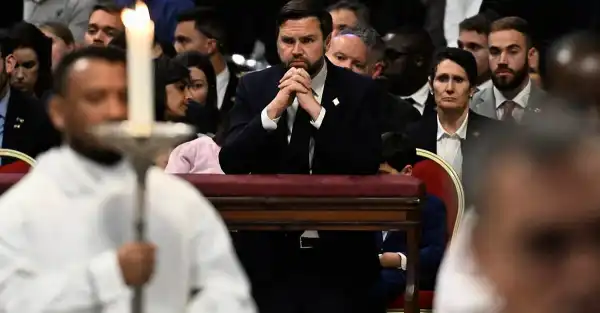The wife of Supreme Court Justice Clarence Thomas wrote to legislators in a crucial swing state after the Trump campaign’s loss in 2020.
-
Send any friend a story
As a subscriber, you have 10 gift articles to give each month. Anyone can read what you share.
Give this article
- Read in app

Virginia Thomas, known as Ginni, at the swearing-in ceremony of Justice Amy Coney Barrett in October 2020.
In the weeks after the 2020 presidential election, Virginia Thomas, the wife of Supreme Court Justice Clarence Thomas, twice lobbied the speaker of the Arizona House and another lawmaker to effectively reverse Joseph R. Biden Jr.’s popular-vote victory and deliver the crucial swing state to Donald J. Trump.
Ms. Thomas, known as Ginni, a right-wing political activist who became a close ally of Mr. Trump during his presidency, made the entreaties in emails to Russell Bowers, the Republican speaker, and Shawnna Bolick, a Republican state representative. Ms. Bolick’s husband, Clint, once worked with Justice Thomas and now sits on the Arizona Supreme Court.
The emails came as Mr. Trump and his allies were engaged in a legal effort to overturn his defeats in several battleground states. While the Arizona emails did not mention either presidential candidate by name, they echoed the former president’s false claims of voter fraud and his legal team’s dubious contention that the power to choose electors therefore rested not with the voters but with state legislatures.
“Do your constitutional duty,” Ms. Thomas wrote the lawmakers on Nov. 9. On Dec. 13, with Mr. Trump still refusing to concede on the eve of the Electoral College vote, she contacted the lawmakers again.
“The nation’s eyes are on you now,” she warned, adding, “Please consider what will happen to the nation we all love if you do not stand up and lead.”
After she sent her first round of emails, but before the second round, Mr. Trump and his personal lawyer, Rudolph W. Giuliani, more directly pressured Mr. Bowers. They called him and urged him to have the state legislature step in and choose Arizona’s electors.
Mr. Bowers could not be reached for comment on Friday. In a statement to The Arizona Republic, a spokesman said that Mr. Bowers never saw Ms. Thomas’s email. He ended up rebuffing all the requests to intervene, even in the face of protests outside his house.
Ms. Bolick, who did not return requests for comment and is now running to become Arizona’s next secretary of state on a platform to “restore election integrity,” proved more of an ally. She thanked Ms. Thomas for reaching out, writing that she hoped “you and Clarence are doing great!” Among other things, she would go on to urge Congress to throw out Arizona’s presidential election results and award the state’s Electoral College votes to Mr. Trump.
The emails, reported earlier by The Washington Post and obtained by The New York Times, were part of a letter-writing campaign hosted on FreeRoots, a political advocacy platform. On Friday, Mark Paoletta, a lawyer and close friend of the Thomases, said on Twitter that Ms. Thomas “did not write the letter and had no input in the content,” but rather merely “signed her name to a pre-written form letter that was signed by thousands of citizens.”
“How disturbing, what a threat!” he wrote, dismissing the revelations as a “lame story.” He added: “A private citizen joining a letter writing campaign, hosted by a platform that served both conservative and liberal causes. Welcome to America.”
In fact, the emails are a reflection of the far broader and more integral role that Justice Thomas’s wife played in efforts to delegitimize the election and install Mr. Trump for a second term — efforts that culminated on Jan. 6, 2021, with a protest called the “March to Save America” that turned into a violent attack on the U.S. Capitol.
As a string of revelations by The Times and other outlets in recent months has demonstrated, Ms. Thomas actively supported and participated at the highest levels in schemes to overturn the election. Those efforts have, in turn, cast a spotlight on her husband, who from his lifetime perch on the Supreme Court has issued opinions favoring Mr. Trump’s efforts to both reverse his loss and stymie a congressional investigation into the events of Jan. 6.
This February, The New York Times Magazine reported on Ms. Thomas’s role on the board of C.N.P. Action, a conservative group that had instructed members to adopt letter-writing tactics — of the kind she personally used in Arizona — to pressure Republican lawmakers in swing states to circumvent voters by appointing alternate electors.
C.N.P. Action had also circulated a newsletter in December 2020 that included a report targeting five swing states, including Arizona, where Mr. Trump and his allies were pressing litigation. It warned that time was running out for the courts to “declare the elections null and void.” The report was co-written by one of Mr. Trump’s leading election lawyers, Cleta Mitchell, a friend of Ms. Thomas.
And in the lead-up to the rally on Jan. 6, Ms. Thomas played a mediating role, uniting feuding factions of planners so that there “wouldn’t be any division,” one of the organizers, Dustin Stockton, later told The Times.
Ms. Thomas declined to speak to The Times for that article, but a few weeks later, in an interview with a friendly conservative outlet, she denied playing any role in the organization of the rally, even as she acknowledged attending it. (She said she left before Mr. Trump addressed the crowd.)
But she has adamantly opposed a fuller inquiry into the insurrection. Last December, she co-signed a letter calling for House Republicans to expel Representatives Liz Cheney and Adam Kinzinger from their conference for joining the committee investigating the Capitol riot, saying it brought “disrespect to our country’s rule of law” and “legal harassment to private citizens who have done nothing wrong.”
And in late March, The Post and CBS reported that she had sent a series of text messages to Mr. Trump’s chief of staff, Mark Meadows, imploring him to take steps to reverse the election. Ms. Thomas urged him to “release the Kraken and save us from the left taking America down,” invoking a slogan popular on the right that refers to a set of conspiratorial claims that Trump supporters believed would overturn the vote. In the text messages, she also indicated that she had been in contact with the president’s son-in-law, Jared Kushner, about a post-election legal strategy.
Democrats expressed outrage. In a letter after the text messages were reported, two dozen Democrats, including Senators Elizabeth Warren, Amy Klobuchar and Cory Booker, wrote: “Given the recent disclosures about Ms. Thomas’s efforts to overturn the election and her specific communications with White House officials about doing so, Justice Thomas’s participation in cases involving the 2020 election and the January 6th attack is exceedingly difficult to reconcile with federal ethics requirements.”
Still, it remains an open question whether the House committee investigating the Jan. 6 attack will seek an interview with Ms. Thomas. In March, people familiar with the committee’s work signaled a desire to ask Ms. Thomas to voluntarily sit for an interview. But the committee has yet to do so, and its chairman, Representative Bennie Thompson, Democrat of Mississippi, told reporters that Ms. Thomas had not come up recently in the panel’s discussions.
Justice Thomas has remained defiant amid questions about his own impartiality, resisting calls that he recuse himself from matters that overlap with his wife’s activism. Earlier this year, when the Supreme Court ruled 8 to 1 to allow the release of records from the Trump White House related to Jan. 6, Justice Thomas was the sole dissenter. In February last year, he sharply dissented when the court declined to hear a case brought by Pennsylvania Republicans seeking to disqualify certain mail-in ballots.
The latest revelations about his wife follow a speech last week in which he lambasted protests in front of the houses of justices after a draft opinion was leaked that would overturn Roe v. Wade, the landmark abortion case. “I wonder how long we’re going to have these institutions at the rate we’re undermining them,” he told a conference of fellow conservatives. “And then I wonder when they’re gone or destabilized, what we’re going to have as a country.”
And he flashed at his own partisanship in claiming that the left’s protests lacked the decorum of the right — while failing to mention last year’s attack on the Capitol, or protests like those in front of Mr. Bowers’s house.
“You would never visit Supreme Court justices’ houses when things didn’t go our way,” he said. “We didn’t throw temper tantrums. It is incumbent on us to always act appropriately and not to repay tit for tat.”
ImageJustice Clarence Thomas and his wife have frequently appeared at political events despite longstanding customs of the Supreme Court.Credit…Drew Angerer/Getty Images
The Thomases have long defied norms of the high court, where justices often avoid political events and entanglements and their spouses often keep low profiles. No spouse of a sitting Supreme Court justice has ever been as overt a political activist as Ms. Thomas. C.N.P. Action, where she sits on the board, is a branch of the Council for National Policy, a secretive conservative organization that includes leaders from the National Rifle Association and the Family Research Council, a Christian advocacy group. Ms. Thomas also founded an organization called Groundswell that holds a weekly meeting of influential conservatives, many of whom work directly on issues that have come before the Supreme Court.
Justice Thomas, for his part, has frequently appeared at political events hosted by advocates hoping to sway the court. He and his wife sometimes appear together at such events, and often portray themselves as standing in the breach amid a crumbling society.
“It’s very exciting,” Ms. Thomas said during a 2018 Council for National Policy meeting, “the fact that there’s a resistance on our side to their side.”
Luke Broadwater, Maggie Haberman and Mark Walker contributed reporting.
Source: nytimes.com



